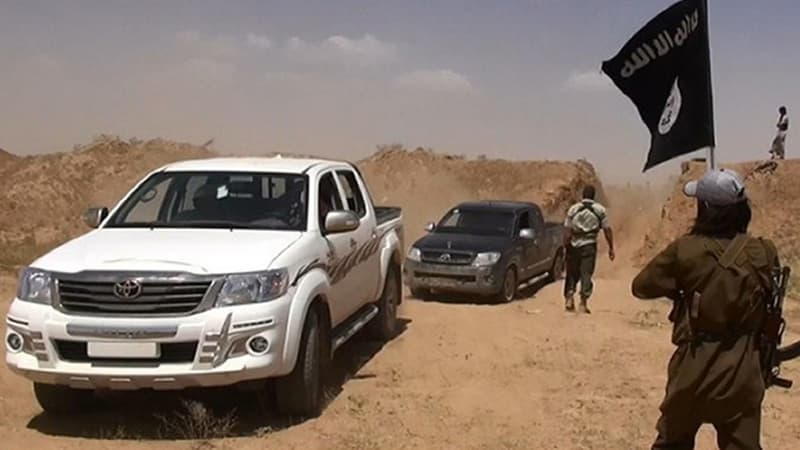Its name may not mean anything to you, but it is still the most active branch of Daesh internationally. The attack on Crocus City Hall in Moscow, which left at least 137 dead and 182 injured on Friday, was last reported to have been claimed by the Islamic State in Khorasan.
A demand that pushed the French government to raise the Vigipirate plan to the highest level. “The claim for the attack on Moscow comes fromIslamic State in Khorasan. However, this organization threatens France and has been involved in several recently foiled attack plans in several European countries, including Germany and France,” Matignon told BFMTV. This branch has already carried out “several attempts” on French soil, Emmanuel Macron also confirmed on Monday, during a speech upon his arrival in Guyana.
An “internationally oriented” branch
This branch of Daesh, also called “IS-K”, was founded in 2014. According to Wassim Nasr, journalist for France 24 and specialist in jihadist movements, Khorassan “is the historical name of this region, which includes Afghanistan, Pakistan, part of the former Soviet republics and part of Iran,” he explained in RMC.
According to a note published in 2021 by the French Institute of International Relations (IFRI), this branch is considered the “bloodiest in Afghanistan.” On August 26, 2021, he claimed responsibility for the attack perpetrated at the Kabul airport, on his own soil, in Afghanistan, which left 173 dead, including 13 American soldiers. It is the deadliest attack against Pentagon forces since 2011 in Afghanistan and the bloodiest attack against the United States ever carried out by ISIS.
In September 2022, IS-K militants claimed responsibility for a deadly suicide attack on the Russian embassy in Kabul. Most recently, on January 3, 2024, this branch carried out a bomb attack in Kerman, Iran, during a memorial procession honoring Iranian General Qassem Soleimani. The attack left more than 100 dead and around 150 injured.
The United States has offered $10 million for any information that would allow “identifying or locating” Sanaullah Ghafari, also known as Shahab al-Muhajir, identified as the leader of IS-K. Born in 1994, “Ghafari is responsible for approving all IS-K operations (…) and finding the financing to carry them out,” estimates the State Department, which blacklisted him in November 2021. American from foreigners. terrorists.”
According to Hans-Jakob Schindler, director of the NGO Counter-Extremism Project (CEP) and former United Nations expert on terrorism, IS-K was created in Afghanistan by IS emissaries from Iraq and Syria.
“They have very close ties with the center, much more than the other subsidiaries” of the group in the world, he explained to AFP, and they obtain the funds they need.
Russia, chosen target
For several years, this branch has been widely exported internationally. “IS-K has established itself as the most internationally oriented branch of IS. It has produced propaganda in more languages than any other affiliate since the height of the (self-proclaimed) caliphate in Iraq and Syria,” explained Lucas Webber, co-founder of the site. specialist Militant Wire, to AFP.
“This international vision includes an ambitious and aggressive campaign to strengthen its external operational capabilities and attack its various enemies abroad,” added Lucas Webber.
Starting with Russia, which is the main objective of the Islamic State in Khorasan. The organization criticized it in particular for its invasion of Ukraine and its military interventions in Africa and Syria, explains Lucas Webber. He recalls the suicide attack against the Russian embassy in Afghanistan in 2022 and emphasizes that the group “is working on its expansion throughout Central Asia and Russia”, including with “Russian-language media to reinforce its support and incite violence in the country”.
On March 7, Russian authorities claimed to have killed suspected IS-K members during an operation in the Kaluga region, southwest of Moscow, accusing them of preparing an attack on a synagogue in the capital. Kazakhstan confirmed the death of two of its citizens in the operation.
ISIS “has been working since 2019 to reestablish an institutional unit in charge of foreign operations. First in Turkey and then in Afghanistan with actors from Central Asia,” he adds.
“It seems they are succeeding. With Afghanistan and Central Asia as a platform to attack Russia, Asia and Turkey as a portal to Europe.”
“Several attempts” in France
In recent years, the Islamic State of Khorasan has been involved in several foiled attacks in several European countries, including Germany. Last Tuesday, German authorities arrested two alleged Afghan jihadists, suspected of having prepared an attack near the Swedish parliament, in a context of high terrorist threat in the Scandinavian country after the burning of the Koran. One of them is said to have joined ISIS from Germany.
Obviously, France is no exception. The Islamic State of Khorassan has already carried out “several attacks” on French soil, Emanuel Macron said this Monday, during a trip to Guyana.
“This particular group, which is apparently involved in this attack, has carried out several attacks on our soil in recent months,” added Emmanuel Macron.
The last event to date, on December 2, 2023, during an attack near the Bir-Hakeim bridge, in the 16th arrondissement of Paris, which left one dead and two injured. The perpetrator of this attack, a 26-year-old young man, presented himself as a member of the Islamic State network in Khorassan.
Two days after the Moscow attack, the Government decided to raise the Vigipirate plan to the highest level, “emergency attack”, Prime Minister Gabriel Attal announced on the afternoon of Sunday, March 24, at the end of the Security Council chaired by Emmanuel. Macron. A decision made due to “the claim of the attack by the Islamic State” and “the threats that weigh” on France, he explained.
“Given its ramifications and its intentions, as a precautionary measure but with credible and solid elements,” he “decided to raise the Vigipirate’s position,” which had been lowered in January, Emmanuel Macron said.
Source: BFM TV


